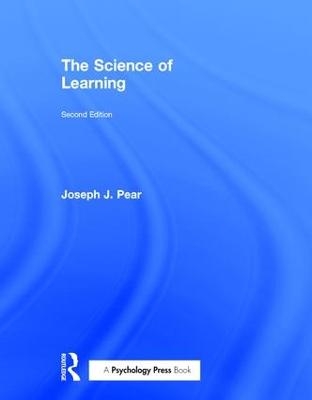
The Science of Learning
Routledge (Verlag)
978-1-84872-472-3 (ISBN)
Joseph J. Pear received his B.S. from the University of Maryland and M.A. and Ph.D. from The Ohio State University. He is currently a professor of psychology at the University of Manitoba. A fellow of Division 6 (Behavioral Neuroscience and Comparative Psychology) and Division 25 (Behavior Analysis) of the American Psychological Association, Pear does both basic and applied behavioral research. For his applied research, he developed the Computer-Aided Personal System of Instruction (CAPSI), an instructional program based on the Keller Plan. CAPSI is an award winning web-based program that is used to teach courses at the University of Manitoba and other universities in Canada and the United States. It is also a research tool that he and his graduate and undergraduate students use to study the teaching and learning dimensions of university education and institutional staff training. For his basic research, he developed a video-training system that he and his graduate and undergraduate students have used to study pigeon operant behavior and currently use to study fish operant behavior. In addition to The Science of Learning, Pear has written two other books, also published by Taylor & Francis: Behavior Modification: What It Is and How to Do It with Garry Martin, now in its 10th edition, and A Historical and Contemporary Look at Psychological Systems. Pear has also written numerous research articles, book chapters, and encyclopedia articles.
CONTENTS
PREFACE ……………………………………………………………………………
PART I. BASIC TERMS AND CONCEPTS ………...…………………………………
Chapter One. INTRODUCTION …………………………………………………
Chapter Two. NonAssociative Learning ………………………………………………………………………………………….
Chapter Three. Associative Learning ………………………………..
Chapter Four. BASIC RESPONDENT AND OPERANT PROCESSES ……
Chapter FIVE. Derivatives of Associative Learning ………….
part II. BASIC stimulus-stimulus and response-stimulus contingencies ……………………………………………………………….…
Chapter Six. STIMULUS PAIRINGS ACROSS RESPONSE SYSTEMS ….
Chapter Seven. BASIC OPERANT BEHAVIOR …………………………..
part III. COMPLEX CONTINGENCIES ……………………………………....Chapter Eight. STIMULUS CONTROL: DISCRIMINATION AND GENERALIZATION ………………………………………………………………
Chapter Nine. CONDITIONAL DISCRIMINATIONS AND EQUIVALENCE CLASSES ……………………………………………………………………………………….
Chapter Ten. Memory: Stimulus Discrimination across Time………………………………………………………………………………...
CHAPTER 11. CONDITIONED REINFORCEMENT …………………………
Chapter Twelve. CONCURRENT SCHEDULES, CHOICE, AND PREFERENCE ……………………………………………………………………..
part IV. MOTIVATION AND EMOTION ……………………………………… Chapter Thirteen. MOTIVATION ……………………………………………..................................................................
Chapter Fourteen. PUNISHMENT …………………………………………………………………………………..…..
Chapter Fifteen. ADJUNCTIVE BEHAVIOR ……………………………………………………………………………………….
part V. EXTENSIONS TO NATURAL SETTINGS 359 …………………… …
Chapter Sixteen. Animals in their Natural Environments ……………………………………………………………………………………….
Chapter Seventeen. HUMANS IN SOCIAL ENVIRONMENTS ……..
GLOSSARY ……………………………………………………..……………......
APPENDICES …………………………………………………………….............
APPENDiX A …………………………………………………………….............
APPENDiX B …………………………………………………………….............
APPENDiX C …………………………………………………………….............
APPENDiX D …………………………………………………………….............
APPENDiX E …………………………………………………………….............
REFERENCES ……………………………………………………………….…
| Zusatzinfo | 2 Tables, black and white; 25 Line drawings, black and white |
|---|---|
| Verlagsort | London |
| Sprache | englisch |
| Maße | 178 x 229 mm |
| Gewicht | 952 g |
| Themenwelt | Geisteswissenschaften ► Psychologie ► Allgemeine Psychologie |
| Geisteswissenschaften ► Psychologie ► Pädagogische Psychologie | |
| Geisteswissenschaften ► Psychologie ► Verhaltenstherapie | |
| Naturwissenschaften ► Biologie ► Genetik / Molekularbiologie | |
| ISBN-10 | 1-84872-472-1 / 1848724721 |
| ISBN-13 | 978-1-84872-472-3 / 9781848724723 |
| Zustand | Neuware |
| Haben Sie eine Frage zum Produkt? |
aus dem Bereich


